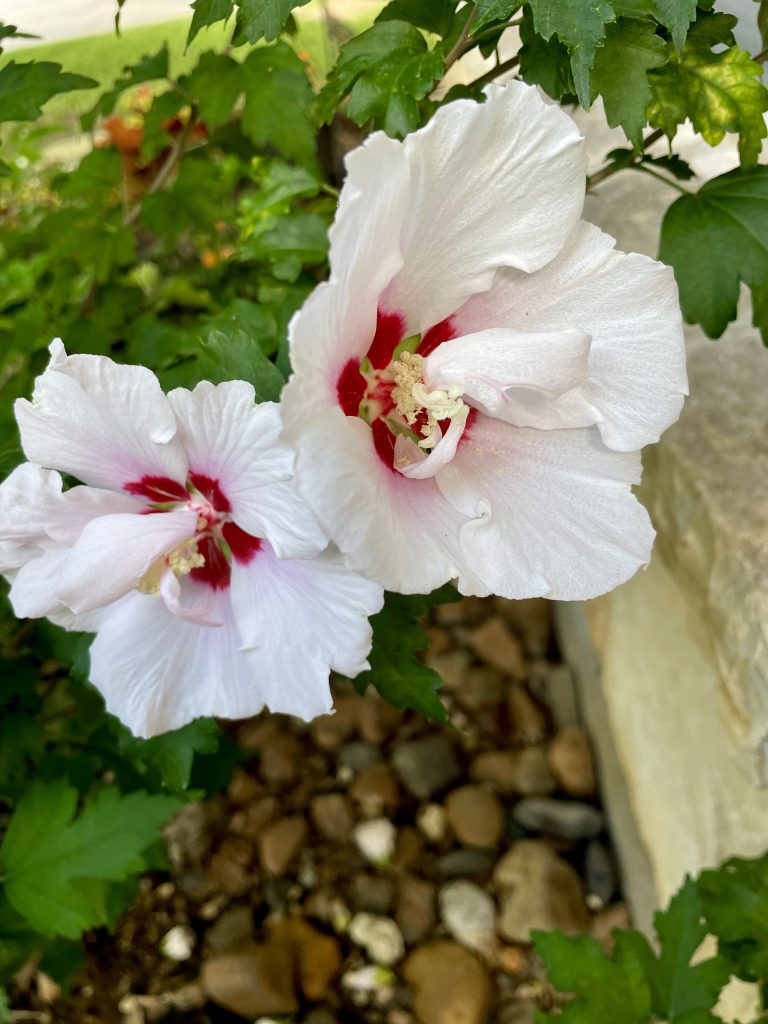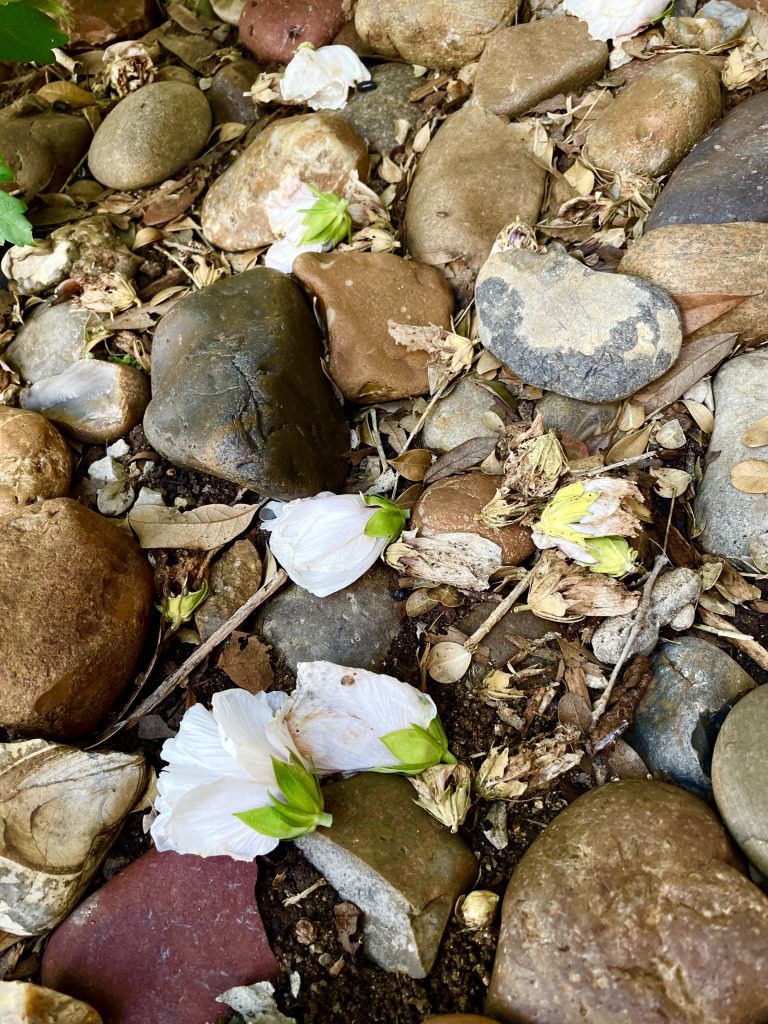Linda Brooks Davis | Let’s Chat

Welcome, everyone. Let’s chat about deadheading doomed blooms.
Scenes and scents. Not long ago I wrote about my first Rose of Sharon bloom this year. At the time, I was mulling over the hymn “Jesus, Rose of Sharon” and noting how His mere presence scents our lives with love, grace, and truth. Today, as I note the pile of dead blooms at the root of my Rose of Sharon, I’m thinking about how He keeps us productive by deadheading our doomed blooms.
Going back to my Rose of Sharon …
 Since the appearance of that first bloom, other blossoms have been popping out all over the bush—a riot of pink fluff. And at the roots, a pile of dead blooms.
Since the appearance of that first bloom, other blossoms have been popping out all over the bush—a riot of pink fluff. And at the roots, a pile of dead blooms.
A garden teaches patience and careful watchfulness.
~Gertrude Jekyll, famed British horticulturist of the 19th century
As a DIY gardener, I’ve learned Gertrude Jekyll’s observation above proves true in my flowerbeds in the blooming seasons.
I started working in flowerbeds when we purchased our first home in 1978. The builder included a few shrubs in the landscaping, but much improvement was needed. So I visited a local nursery to look for “color.” I made lots of mistakes, like choosing a “shade” plant for a spot in the “full sun” or vice versa. And I asked lots of questions about types of soil for types of plants. But I don’t recall getting my hands very dirty.
It wasn’t until we moved into our second home in 1979 that I bought a shovel, spade, trowel, and rake. And got my hands very dirty. Little by little, I learned about fertilizers, soils, types of plants, tools, and how very much work gardening requires.
I discovered never to leave the wilting blooms to dry up and fall off. Instead, I learned to remove them at the first sign of decay—to “deadhead” them, if you will. Why? Because the plant’s resources are best used for producing new blossoms rather than struggling to maintain the “doomed blooms.”
To deadhead properly, I must be patient, careful, and watchful.
 Patient with the baby plants, as well as those past their prime. Careful where I set my feet and how I handle healthy blooms. And watchful for the first signs of dry, drooping heads.
Patient with the baby plants, as well as those past their prime. Careful where I set my feet and how I handle healthy blooms. And watchful for the first signs of dry, drooping heads.
This principle proves true in the garden and at my writing desk. But it’s the editor who wears the “dead header” cap, and—wow—am I grateful. Just as I snap off unappealing, discolored, sagging garden blooms, the editor deletes the unappealing and sagging words and passages in my garden of words. As a result, the rest of the passages breathe new life and bloom on the page.
According to Jesus, the same is true of our spiritual lives. Consider what He said about the Gardener and the vine He tends:
I am the true vine, and my Father is the gardener.
He cuts off every branch in me that bears no fruit,
while every branch that does bear fruit he prunes
so that it will be even more fruitful.
John 15:1-2
Until recently, this passage discouraged me.
Would I ever maintain the bounty and quality of fruit that God is looking for? I would never measure up. Surely I was doomed.
But while working in the soil this spring, the Lord opened my mind to His deeper message. As I look over a bed of blooming plants, I find some heavy with flowers and others with only a few sprinkled through. Rather than pulling up and throwing away the plants with few blooms, I apply that patience and careful watchfulness Jekyll notes. I prune, feed, and deadhead them.
 It’s only when a plant produces no blooms, turns a sickly color, and shrivels that I declare it doomed, pull it up, and throw it away.
It’s only when a plant produces no blooms, turns a sickly color, and shrivels that I declare it doomed, pull it up, and throw it away.
What an encouraging realization: the eternal Gardener uproots the vines that produce no fruit. But He tends the others, especially those with few blooms—pruning, feeding, and watering to encourage more fruit.
Rather like when I lay my writing alongside many other writers’ work, my spiritual “blooms” are far less significant in size and quality than many others in God’s garden. But rather than pulling me up from the roots and throwing me away, the Lord deadheads my doomed blooms and prunes where needed. One bloom at a time.
Isn’t this at the essence of God’s amazing grace? I’d love to hear about your “deadheading” experiences.

I can relate to so much of what you write here as I’ve had similar experiences in my flower beds over the years. Your analogy, Linda, is inspirational and your message encourages me to keep trusting in our Heavenly Father for His ongoing pruning and deadheading in my heart and in my writing. Thank you for these wise words today.
Thanks a lot! You’ve made my day, Pat. Bless!